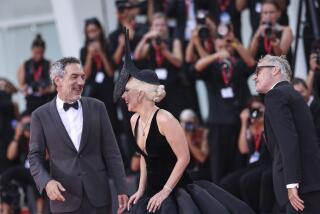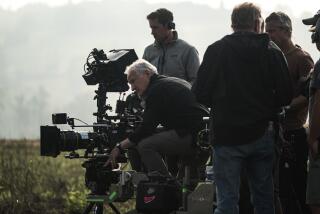âSecondsâ Gets Another Shot
Every filmmaker has a failure heâd like to forget. For John Frankenheimer, itâs âSeconds,â the bizarre yet disturbing Faustian parable that starred Rock Hudson in his most prominent dramatic departure.
Now considered a cult classic for its experimental visual style and postmodern-like angst, the 1966 film gets its own second chance Tuesday when it goes from obscurity to home video as a Paramount VHS rental (and June 3 as a Pioneer widescreen laserdisc).
Whatâs more, the version being released is the European cut--featuring nudity during a controversial grape-stomping sequence staged like a bacchanal.
âItâs the only picture thatâs gone from failure to classic without having success,â Frankenheimer suggests. âItâs not in my top six, but people love this picture.â
Itâs no wonder: âSecondsâ is a fascinating failure because of its daring risks.
The film has a wild premise (unfulfilled middle-aged banker John Randolph is ârebornâ through plastic surgery as the younger Hudson) with a macabre sense of humor; it has James Wong Howeâs surreal black-and-white cinematography with that unforgettable fish-eye lens (earning him an Academy Award nomination); it has Jerry Goldsmithâs eerie, organ-driven score; and it has Saul Bassâ ominous main titles.
But, most of all, âSecondsâ has Hudsonâs unusual performance, which has been elevated to the sublime as a result of the actorâs own personal tragedy. The anguish and sorrow and regret he displays in trying to lead a secret identity are genuine.
âWhat the picture really says is that you are who you are,â Frankenheimer explains. âAs soon as you try to erase the past, youâre doomed.â
Like most of Frankenheimerâs films, âSecondsâ also touches on the theme of duality--but with more shocking consequences.
The director believes time may be kinder to this difficult film. âI think audiences will be more responsive to the film today. What it has to say may be more relevant.â
âSecondsâ screenwriter Lewis John Carlino agrees: âIt was way ahead of its time and the Faustian theme was hard for people to take. It was all part of a statement about our culture, how people had surrendered their lives to be what society told them to be. But Hudson did a terrific job, stepping so far out of his usual role. He really got into his own hysteria during the intense moments.â
Frankenheimer, who provides audio commentary on the laserdisc, says Hudson only got the role after one star passed and another was rejected by Paramount.
âI never thought of using two actors,â Frankenheimer admits. âI thought, âWhoâs the best actor I can get to do this?â I wanted Kirk Douglas, whose company was producing the film. But he was unavailable.
âThen I thought about Laurence Olivier. I flew to England, gave him the script, met with him and he said he would do it. Then I went back to Paramount and told them, âMy God, weâve got Olivier!â They werenât interested--he wasnât a big-enough star.â
The director was then approached by Hudsonâs agent. Although Frankenheimer didnât really take Hudson seriously, he met the star as a courtesy.
âHe was one of the nicest guys Iâve ever met. He really wanted to do this picture, but he would only do it as the second character. He didnât think he could handle the older character.â
*
After rethinking the concept, Frankenheimer--who was at the height of his popularity, with a string of hits that included âBirdman of Alcatraz,â âSeven Days in Mayâ and âThe Manchurian Candidateâ--surrounded Hudson with an impressive acting ensemble.
Most noteworthy were three actors who were previously blacklisted: Randolph, Will Geer and Jeff Corey.
Frankenheimer claims he hired them intentionally to make up for all those frustrating years as a director at CBS in the â50s, when he lacked the freedom to hire whoever he wanted.
But âSecondsâ was doomed from the start: The film was booed at the Cannes Film Festival during a time of political upheaval and anti-Hollywood sentiment, and Paramount lost faith and didnât provide proper support.
âThey marketed the film all wrong,â Frankenheimer insists. âThey made it into a horror film instead of elevating it with dignity and intelligence.â
As a result, the director suffered his first major failure--a setback that took years to overcome.
Frankenheimer stresses, however, that the filmâs failure solely rests with him. âI shouldâve demanded a better second act. I also should have never cut a scene where John [Randolph] meets with his daughter--incidentally, played by my wife, Evans.â
*
Then thereâs the confusion about the filmâs final abstract image of a man carrying a little girl on his shoulders.
âThat refers to a previous scene that was also cut,â Carlino explains. âHudson encounters a father and his young daughter on the beach. Itâs the key scene for me. Without it, the last image doesnât make sense.â
Despite having to make too many compromises, Frankenheimer still has fond memories of collaborating with the legendary Howe (they met every Saturday at a Turkish bath) and directing Randolph (who learned to be left-handed to match Hudson).
âAt least the grape scene comes across now [in the restored European version],â he says. âThe Catholic Church objected to the nudity, so it was cut. But it made the grape-stomping [seem] like an orgy. That was not my intention. It was supposed to be a release for the guy.
âMy great disappointment is that we didnât get Kirk. If he had done it, it wouldâve been a real classic.â
More to Read
Only good movies
Get the Indie Focus newsletter, Mark Olsen's weekly guide to the world of cinema.
You may occasionally receive promotional content from the Los Angeles Times.










